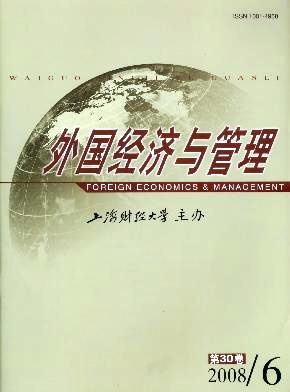成长型心智模式与职业生涯成功研究
外国经济与管理 2008 年 第 30 卷第 06 期, 页码:59 - 65
摘要
参考文献
摘要
职业生涯成功是职业生涯理论研究的出发点和归宿。本文首先阐述了职业生涯成功的内涵,提出了新的职业生涯成功评价标准,并指出"成长型心智模式"是职业生涯成功最关键的影响因素之一;然后分析了"成长型心智模式"的内涵和结构,并揭示了其影响职业生涯成功的作用机理。
①世界银行组织乔尔.赫尔曼、丹尼尔.考夫曼等专家考察了转型国家的企业对政府的影响,他们在《解决转轨国家中的政府俘获问题》一文中用实证研究的方法表明,很多企业家通过将其才智用于俘获政府,而非企业创新而获得了成功。参见:乔尔.赫尔曼,丹尼尔.考夫曼.解决转轨国家中的政府俘获问题[A].吴敬琏.比较(5)[C].北京:中信出版社,2003。
[1]London,M,and Stumpf,S A.Managing careers[M].Reading,MA:Addison Wesley,1982:5.
[2]Gattiker,U E,and Larwood,L.Predictors for managers’career mobility,success and satisfaction[J].Human Relations,1988,41:569-591.
[3]Nigel Nicholson,and Wendy de Waal-Andrews.Playing to win:Biological i mperative,self-regulation,and trade-offs in the game ofcareer success[J].Journal of Organizational Behavior,2005,26(2):137-154.
[4]Michael B Arthur,Svetlana N Khapova,and Celeste P M Wilderom.Career successin a boundaryless career world[J].Journal of Or-ganizational Behavior,2005,26(2):177-202.
[5]Korman,A K,U Wittig-Berman,and D Lang.Career success and personal failure:Alienationin professionals and managers[J].A-cademy of Management Journal,1981,24(2):342-360.
[6]Johnson-Laird,P.Mental models:Towards a cognitive science of language,inference,and consciousness[M].Cambridge,MA:Harvard University Press,1983:397.
[7](美)彼得.圣吉.第五项修炼[M].(郭进隆译).上海:上海三联书店,1998:9.
[8]Ti mothy AJudge.An empirical investigation of the predictors of executive career success[J].Personnel Psychology,1995,48:485-519.
[9]Scott E Seibert,Maria L Krai mer,and Robert C Liden.Asocial capital theory of career success[J].Academy of Management Jour-nal,2001,44(2):219-237.
[10]Ti mothy AJudge.The big five personality traits,general mental ability,and career success across the life span[J].Personnel Psy-chology,1999,52(3):621-652.
[11]Kuijpers,Marinka A C T.Career competencies for career success[J].The Career Development Quarterly,2006,55(12):168-178.
[12]Douglas T Hall,and Dawne Chandler.Psychological success:When the career is a calling[J].Journal of Organizational Behavior,2005,26(2):155-176.
[13]Steven H Appelbaum,and Alan Hare.Self-efficacy as a mediator of goal setting and performance:Some human resource applications[J].Journal of Managerial Psychology,1996,11(3):33-47.
[14]Kammeyer-Mueller,John D.Self-esteemand extrinsic career success:Test of a dynamic model[J].Applied Psychology:An Inter-national Review,2008,57(2):204-224.
[15]Harris,Lloyd C.Approaches to career success:An exploration of surreptitious career-success strategies[J].Human Resource Man-agement,2006,45(1):43-65.
[16]Henkoff,R.Winning the newcareer game[J].Fortune,1993,128(1):46-49.
[17]Fisher,A.Six ways to supercharge your career[J].Fortune,1997,135(1):46-48.
[18](奥)贝塔朗菲.一般系统论:基础、发展、应用[M].(秋同等译).北京:社会科学文献出版社,1987:32-43.
[19](美)班杜拉.思想和行动的社会基础——社会认知论[M].(林颖等译).上海:华东师范大学出版社,2001:49.
[20](美)鲁森斯.组织行为学[M].(王磊译).北京:人民邮电出版社,2003:220.
[1]London,M,and Stumpf,S A.Managing careers[M].Reading,MA:Addison Wesley,1982:5.
[2]Gattiker,U E,and Larwood,L.Predictors for managers’career mobility,success and satisfaction[J].Human Relations,1988,41:569-591.
[3]Nigel Nicholson,and Wendy de Waal-Andrews.Playing to win:Biological i mperative,self-regulation,and trade-offs in the game ofcareer success[J].Journal of Organizational Behavior,2005,26(2):137-154.
[4]Michael B Arthur,Svetlana N Khapova,and Celeste P M Wilderom.Career successin a boundaryless career world[J].Journal of Or-ganizational Behavior,2005,26(2):177-202.
[5]Korman,A K,U Wittig-Berman,and D Lang.Career success and personal failure:Alienationin professionals and managers[J].A-cademy of Management Journal,1981,24(2):342-360.
[6]Johnson-Laird,P.Mental models:Towards a cognitive science of language,inference,and consciousness[M].Cambridge,MA:Harvard University Press,1983:397.
[7](美)彼得.圣吉.第五项修炼[M].(郭进隆译).上海:上海三联书店,1998:9.
[8]Ti mothy AJudge.An empirical investigation of the predictors of executive career success[J].Personnel Psychology,1995,48:485-519.
[9]Scott E Seibert,Maria L Krai mer,and Robert C Liden.Asocial capital theory of career success[J].Academy of Management Jour-nal,2001,44(2):219-237.
[10]Ti mothy AJudge.The big five personality traits,general mental ability,and career success across the life span[J].Personnel Psy-chology,1999,52(3):621-652.
[11]Kuijpers,Marinka A C T.Career competencies for career success[J].The Career Development Quarterly,2006,55(12):168-178.
[12]Douglas T Hall,and Dawne Chandler.Psychological success:When the career is a calling[J].Journal of Organizational Behavior,2005,26(2):155-176.
[13]Steven H Appelbaum,and Alan Hare.Self-efficacy as a mediator of goal setting and performance:Some human resource applications[J].Journal of Managerial Psychology,1996,11(3):33-47.
[14]Kammeyer-Mueller,John D.Self-esteemand extrinsic career success:Test of a dynamic model[J].Applied Psychology:An Inter-national Review,2008,57(2):204-224.
[15]Harris,Lloyd C.Approaches to career success:An exploration of surreptitious career-success strategies[J].Human Resource Man-agement,2006,45(1):43-65.
[16]Henkoff,R.Winning the newcareer game[J].Fortune,1993,128(1):46-49.
[17]Fisher,A.Six ways to supercharge your career[J].Fortune,1997,135(1):46-48.
[18](奥)贝塔朗菲.一般系统论:基础、发展、应用[M].(秋同等译).北京:社会科学文献出版社,1987:32-43.
[19](美)班杜拉.思想和行动的社会基础——社会认知论[M].(林颖等译).上海:华东师范大学出版社,2001:49.
[20](美)鲁森斯.组织行为学[M].(王磊译).北京:人民邮电出版社,2003:220.
引用本文
王鉴忠, 宋君卿. 成长型心智模式与职业生涯成功研究[J]. 外国经济与管理, 2008, 30(6): 59–65.
导出参考文献,格式为:
上一篇:参照群体对消费决策影响研究述评





 8293
8293  881
881

